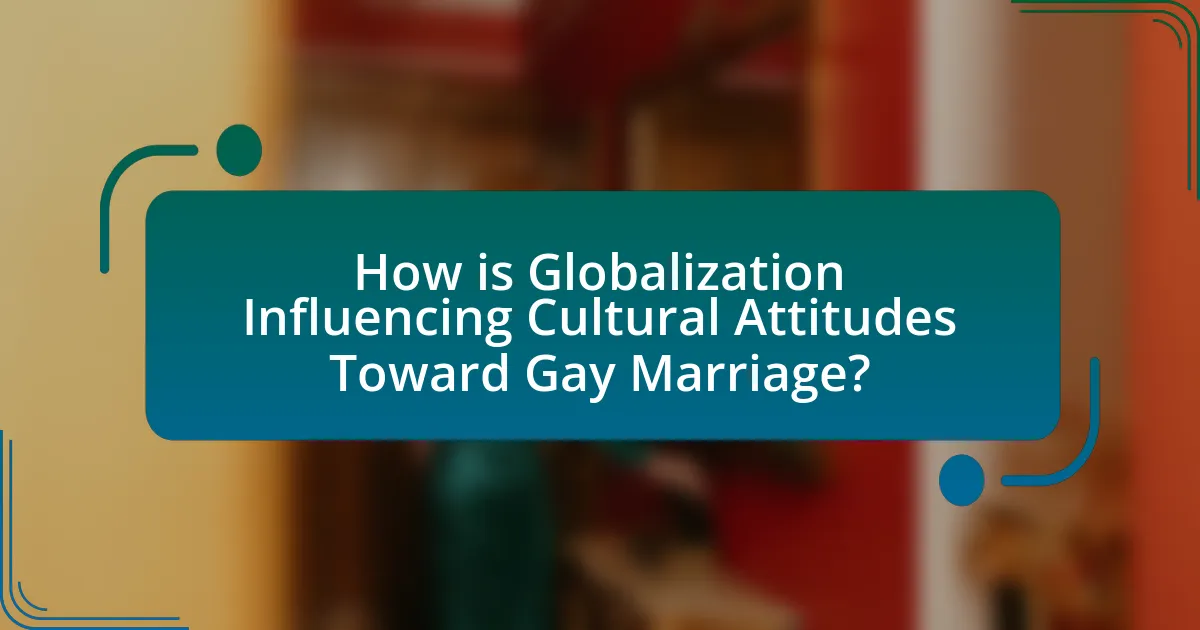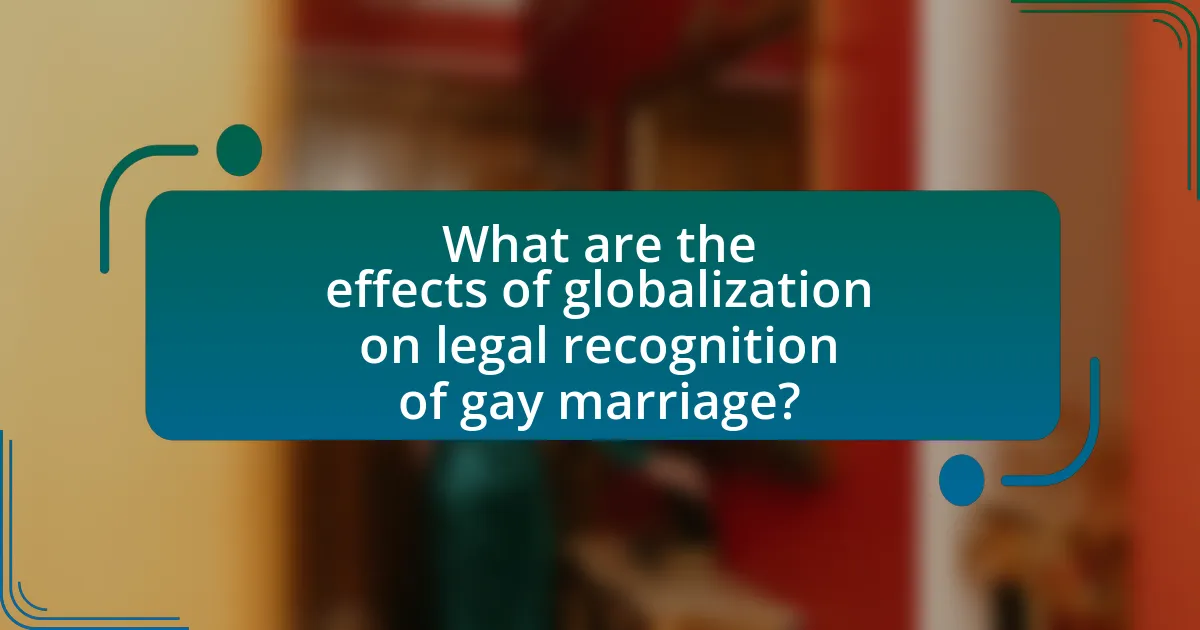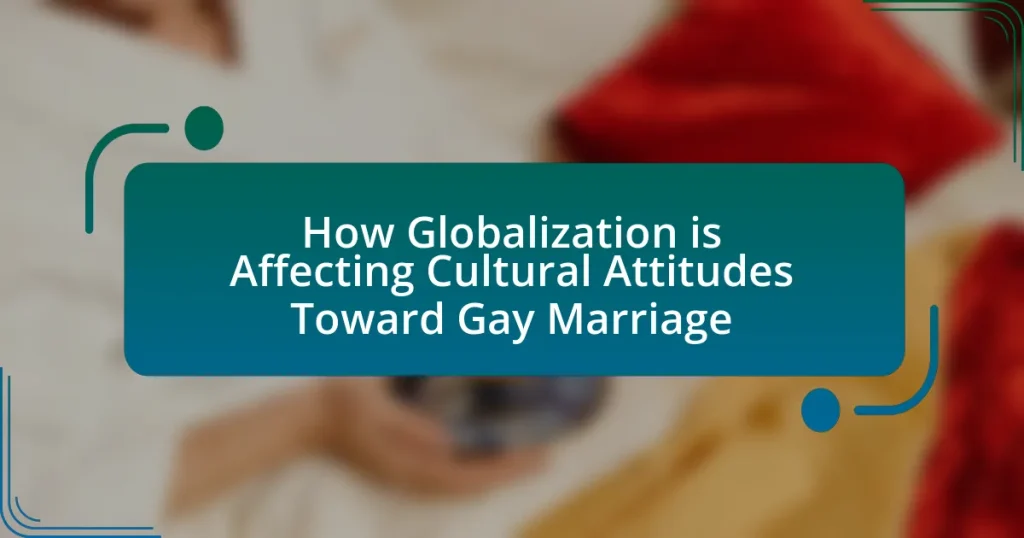The article examines how globalization is influencing cultural attitudes toward gay marriage, highlighting the exchange of ideas and norms that leads to increased acceptance in various societies. Key factors such as enhanced communication, economic interdependence, and migration are discussed as drivers of this shift, with research indicating that countries more integrated into the global economy tend to show higher support for LGBTQ+ rights. The article also explores the impact of technological advancements, historical contexts, and religious beliefs on societal views, as well as the legal recognition of gay marriage influenced by international human rights movements. Additionally, it addresses the challenges posed by cultural clashes and resistance movements, while suggesting strategies for promoting acceptance of gay marriage globally through education and advocacy.

How is Globalization Influencing Cultural Attitudes Toward Gay Marriage?
Globalization is influencing cultural attitudes toward gay marriage by facilitating the exchange of ideas and norms across borders, leading to increased acceptance in many societies. As countries engage in global communication and cultural exchange, exposure to progressive views on LGBTQ+ rights, including gay marriage, has risen. For instance, nations that have adopted same-sex marriage often serve as models for others, demonstrating the social and economic benefits of inclusivity. Research from the Pew Research Center indicates that in countries with higher levels of globalization, such as those with strong media presence and international trade, public support for gay marriage tends to be significantly higher compared to less globalized nations. This trend illustrates how globalization can reshape cultural attitudes by promoting dialogue and understanding around LGBTQ+ issues.
What are the key factors of globalization affecting cultural attitudes?
The key factors of globalization affecting cultural attitudes include increased communication, economic interdependence, and migration. Increased communication through the internet and social media allows for the rapid exchange of ideas and values, leading to greater awareness and acceptance of diverse cultural practices, including attitudes toward gay marriage. Economic interdependence fosters interactions among different cultures, often resulting in the adoption of more liberal social norms as societies engage with global markets that prioritize inclusivity. Migration introduces individuals to new cultural perspectives, which can challenge traditional views and promote acceptance of LGBTQ+ rights. These factors collectively contribute to shifting cultural attitudes toward gay marriage in various societies.
How does economic globalization impact societal views on gay marriage?
Economic globalization positively influences societal views on gay marriage by promoting cultural exchange and increasing exposure to diverse perspectives. As countries engage in global trade and communication, they often adopt more progressive social norms, including acceptance of LGBTQ+ rights. For instance, nations that have integrated into the global economy, such as those in Western Europe, tend to show higher levels of support for gay marriage, with public opinion polls indicating that over 70% of people in countries like the Netherlands and Sweden favor legalization. This shift is often linked to the influence of international human rights standards and advocacy from global organizations, which encourage inclusive policies.
What role does technological advancement play in shaping perceptions?
Technological advancement significantly influences perceptions by facilitating the rapid dissemination of information and diverse viewpoints. The internet and social media platforms enable individuals to access a wide range of perspectives on social issues, including gay marriage, which can challenge traditional beliefs and foster more inclusive attitudes. For instance, studies show that exposure to positive representations of LGBTQ+ individuals online correlates with increased acceptance of gay marriage in various cultures. This shift in perception is further supported by data indicating that countries with higher internet penetration rates tend to exhibit more progressive attitudes toward LGBTQ+ rights, highlighting the role of technology in shaping societal norms.
Why do cultural attitudes toward gay marriage vary across different regions?
Cultural attitudes toward gay marriage vary across different regions due to a combination of historical, religious, and social factors. For instance, regions with strong religious influences, such as parts of the Middle East and Africa, often oppose gay marriage based on traditional beliefs and doctrines. In contrast, Western countries, particularly in Europe and North America, have increasingly embraced gay marriage, reflecting progressive social movements and legal reforms that promote LGBTQ+ rights. According to a 2021 Pew Research Center survey, acceptance of same-sex marriage is significantly higher in countries like Sweden and Canada, where legal recognition and societal support have been established, compared to nations where such rights are still contested or nonexistent. This divergence illustrates how local cultural contexts, shaped by history and societal norms, influence attitudes toward gay marriage.
How do historical contexts influence current attitudes?
Historical contexts significantly shape current attitudes by establishing foundational beliefs and norms that persist over time. For instance, the historical marginalization of LGBTQ+ communities has led to deeply ingrained societal biases, which continue to influence contemporary views on gay marriage. Research indicates that countries with a history of colonialism and anti-LGBTQ+ laws often exhibit more resistance to gay marriage, as seen in regions like Africa and parts of Asia, where colonial-era laws still impact legal frameworks and social acceptance. Conversely, nations that have embraced progressive movements and legal reforms, such as those in Western Europe, demonstrate more favorable attitudes toward gay marriage, reflecting a historical trajectory of civil rights advancements. Thus, the interplay between historical events and current societal attitudes is evident in the varying acceptance of gay marriage across different cultures.
What is the impact of religious beliefs on acceptance of gay marriage?
Religious beliefs significantly influence the acceptance of gay marriage, often leading to opposition based on doctrinal teachings. For instance, many conservative religious groups interpret sacred texts as condemning same-sex relationships, which shapes their followers’ views against gay marriage. According to a 2019 Pew Research Center study, 70% of white evangelical Protestants in the United States oppose same-sex marriage, reflecting how religious doctrine directly impacts societal attitudes. In contrast, more liberal religious groups tend to support gay marriage, indicating that the interpretation of religious beliefs plays a crucial role in shaping acceptance levels.

What are the effects of globalization on legal recognition of gay marriage?
Globalization has significantly influenced the legal recognition of gay marriage by promoting the exchange of ideas and norms across borders, leading to increased acceptance and legal reforms in various countries. For instance, as countries engage in international dialogue and observe the legal advancements in others, such as the legalization of gay marriage in nations like Canada and the Netherlands, they often feel pressured to adopt similar measures to align with global human rights standards. This trend is supported by data from the International Lesbian, Gay, Bisexual, Trans and Intersex Association, which indicates that as of 2021, over 30 countries have legalized same-sex marriage, reflecting a shift in cultural attitudes driven by globalization.
How has globalization contributed to changes in marriage laws worldwide?
Globalization has significantly influenced changes in marriage laws worldwide by promoting the exchange of ideas and values across cultures, leading to greater acceptance of diverse marriage forms, including same-sex marriage. This shift is evidenced by the increasing number of countries legalizing same-sex marriage, such as the Netherlands in 2001, which set a precedent that has been followed by numerous nations, including the United States in 2015 and Taiwan in 2019. The spread of information through global media and international advocacy has facilitated discussions around human rights and equality, prompting legal reforms that reflect changing societal attitudes towards marriage.
What examples illustrate the shift in legal recognition due to globalization?
Legal recognition of gay marriage has shifted significantly due to globalization, with notable examples including the legalization of same-sex marriage in countries like Canada and Spain, which influenced other nations to reconsider their laws. For instance, Canada legalized same-sex marriage in 2005, becoming one of the first countries to do so, which set a precedent that encouraged other nations to follow suit. Similarly, Spain’s legalization in 2005 marked a significant cultural shift in a predominantly Catholic country, demonstrating how global trends can impact local legal frameworks. These changes reflect a broader acceptance of LGBTQ+ rights influenced by international human rights discourse and transnational advocacy networks, showcasing the interconnectedness of legal recognition across borders.
How do international human rights movements affect local laws?
International human rights movements significantly influence local laws by promoting the adoption of legal frameworks that protect individual rights and freedoms. These movements often advocate for the recognition of marginalized groups, including the LGBTQ+ community, leading to changes in legislation that align with international human rights standards. For instance, the global push for marriage equality has resulted in numerous countries revising their laws to permit same-sex marriage, reflecting the impact of international advocacy. A notable example is the legalization of same-sex marriage in countries like Ireland and Germany, which followed extensive campaigns by human rights organizations that highlighted the need for equality and non-discrimination. This demonstrates how international human rights movements can effectively shape local legal landscapes by fostering dialogue, raising awareness, and pressuring governments to comply with global human rights norms.
What challenges arise from globalization in the context of gay marriage?
Globalization presents several challenges in the context of gay marriage, primarily through cultural clashes and legal disparities. As countries become more interconnected, differing cultural attitudes toward homosexuality can lead to tensions; for instance, nations with conservative views may resist the acceptance of gay marriage, while more progressive countries advocate for it. This disparity creates a complex legal landscape where same-sex couples may face recognition issues when traveling or relocating across borders. Additionally, globalization can amplify the influence of multinational corporations that may promote LGBTQ+ rights, leading to backlash in regions where such rights are not accepted. These challenges highlight the ongoing struggle for equality and recognition in a globalized world, where cultural norms and legal frameworks vary significantly.
How do cultural clashes impact the acceptance of gay marriage?
Cultural clashes significantly hinder the acceptance of gay marriage by creating divisions between traditional beliefs and modern values. In societies where conservative views dominate, such as in many parts of Africa and the Middle East, resistance to gay marriage is often rooted in religious and cultural norms that prioritize heterosexual unions. For instance, a Pew Research Center study from 2020 found that in countries like Nigeria and Egypt, over 90% of the population opposes same-sex marriage, reflecting deep-seated cultural attitudes. Conversely, in more liberal societies, such as those in Western Europe and North America, acceptance is bolstered by progressive movements and legal recognition, illustrating how cultural context shapes attitudes toward gay marriage. Thus, cultural clashes manifest in varying degrees of acceptance, influenced by the interplay of globalization and local traditions.
What resistance movements have emerged in response to globalization?
Resistance movements that have emerged in response to globalization include anti-globalization protests, localism initiatives, and cultural preservation movements. Anti-globalization protests, such as those seen during the World Trade Organization meetings in Seattle in 1999, highlight opposition to economic policies perceived to undermine local economies and cultures. Localism initiatives advocate for the prioritization of local goods and services over global trade, aiming to strengthen community ties and reduce dependency on multinational corporations. Cultural preservation movements seek to protect indigenous cultures and traditions from the homogenizing effects of globalization, as seen in various campaigns worldwide that emphasize the importance of maintaining cultural identity in the face of global influences. These movements collectively reflect a pushback against the perceived negative impacts of globalization on local cultures and economies.
How can understanding globalization’s impact on gay marriage inform future discussions?
Understanding globalization’s impact on gay marriage can inform future discussions by highlighting how cultural exchanges and international norms shape societal attitudes. Globalization facilitates the spread of progressive values, as seen in countries where exposure to global LGBTQ+ rights movements has led to increased acceptance and legal recognition of gay marriage. For instance, the legalization of same-sex marriage in countries like Canada and Spain has influenced neighboring nations, demonstrating a ripple effect driven by global advocacy and shared human rights frameworks. This interconnectedness underscores the importance of considering diverse cultural perspectives and the role of international dialogue in shaping policies related to gay marriage.
What strategies can be employed to promote acceptance of gay marriage globally?
To promote acceptance of gay marriage globally, advocacy through education and awareness campaigns is essential. These campaigns can highlight the benefits of marriage equality, such as improved mental health outcomes and social cohesion, supported by studies indicating that legal recognition of same-sex relationships leads to lower rates of suicide and mental health issues among LGBTQ+ individuals. Additionally, engaging influential community leaders and utilizing social media platforms can help reshape public perceptions by fostering dialogue and sharing personal stories that humanize the issue. Research from the Pew Research Center shows that increased visibility and representation of LGBTQ+ individuals in media correlate with greater acceptance, reinforcing the importance of diverse narratives in promoting understanding and acceptance of gay marriage worldwide.
How can education play a role in changing cultural attitudes?
Education can significantly change cultural attitudes by promoting awareness and understanding of diverse perspectives. Through structured curricula that include topics on human rights, gender equality, and LGBTQ+ issues, educational institutions can challenge stereotypes and foster empathy. Research indicates that countries with comprehensive sex education and inclusive curricula report more progressive attitudes toward gay marriage. For instance, a study published in the Journal of Homosexuality found that students exposed to inclusive education were more likely to support LGBTQ+ rights, demonstrating the direct impact of education on cultural perceptions.
What best practices can be adopted from successful case studies?
Best practices that can be adopted from successful case studies on globalization’s impact on cultural attitudes toward gay marriage include fostering open dialogue, leveraging media representation, and engaging community leaders. Open dialogue allows for the exchange of diverse perspectives, which can reduce stigma and promote understanding. For instance, case studies from countries that have legalized gay marriage often highlight the importance of public discussions that involve both supporters and opponents, leading to more informed communities. Media representation plays a crucial role in shaping perceptions; successful case studies demonstrate that positive portrayals of LGBTQ+ individuals in media can shift public attitudes. Additionally, involving community leaders in advocacy efforts has proven effective, as their influence can help bridge cultural divides and foster acceptance. These practices are supported by research indicating that inclusive dialogue and representation significantly contribute to changing societal norms regarding gay marriage.
What are the implications for policymakers regarding gay marriage and globalization?
Policymakers face significant implications regarding gay marriage and globalization, as globalization influences cultural attitudes and legal frameworks surrounding LGBTQ+ rights. The increasing interconnectedness of societies leads to the diffusion of progressive values, which can pressure policymakers to adopt more inclusive policies. For instance, countries that have embraced globalization often see shifts in public opinion favoring gay marriage, as evidenced by the legalization of same-sex marriage in over 30 countries since 2001, reflecting changing cultural norms. This trend necessitates that policymakers consider international human rights standards and public sentiment, as failure to adapt may result in social unrest or international criticism.


